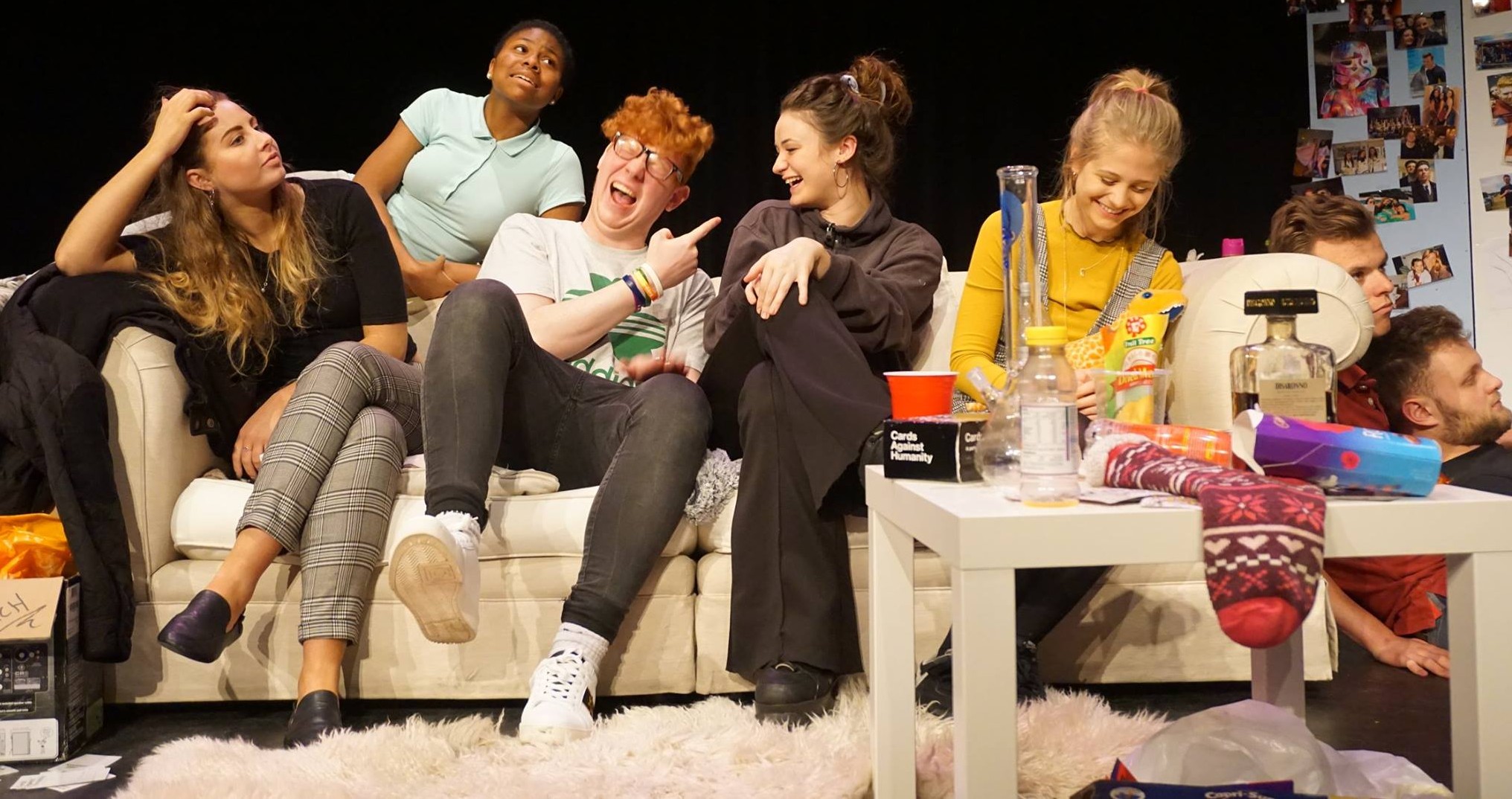Hormones review: “This is a play about your life”
It has always seemed odd to me how little art is made about students, considering how many young people are going through this odyssey. Other than Channel 4’s Fresh Meat, the process of sticking 18-22-year-olds all together usually many miles away from their parents, ripe as it is for drama and comedy, is woefully underexploited. Student writer Elizabeth Plant’s new play Hormones, about a group of 10 students’ lives, loves and laughs, tackles exactly that. Hormones not only carves out a place for students’ stories in our university’s own Arts Centre, but it delivers a tight, funny and occasionally heart-breaking two hours.
The play centres on a house of students at an unspecified university welcoming in a new housemate, Sam (played by Eliza Beresford). She meets gay couple Toby (Luke Mott) and Ari (Matt Anderson), business student Beth (Chloe Binfield), drama students Camilla (Celine Nithilia-George) and Jo (Adam Oliver), and besties Ben (Charlie Coombes-Roberts) and Rose (Laura Miravitlles). The play sees this group bicker, party together, and support each other through their problems.
Hormones delivers a tight, funny and occasionally heart-breaking two hours
There are two romantic plotlines: Sam’s unrequited love for her best friend, Charlotte (Georgie Head), and the triangle between Rose, Ben and a mysterious Tindr flame (Dillon Rix). Plant does an excellent job of weaving these stories together with the troubles of the other house members. While there are certainly slower moments which provide relief from the drama, it all feels very cohesive. The tone of the piece idles between the comedy of housemate banter versus the melodrama we all experience in university relationships, romantic or otherwise.
The fact that Hormones is at its core a play about students, written, directed and performed by students, with an audience of mostly students, creates an inside-joke-y feel to the whole experience. The second you enter the theatre and see Domino’s pizza boxes stacked in a corner, you feel that this is a play about your life. There is something very validating about seeing people on stage going through the same ups and downs of life as you are. Plant’s set design fully supports this, creating an authentic, messy space filled to the brim with bottles, wrappers, blankets and whatever else is in a student home – including, of course, a cardboard cut-out of Phillip Schofield.
The tone of the piece idles between the comedy of housemate banter versus the melodrama we all experience in university relationships
The problem the team runs into with staging students’ lives in front of students is the question of accuracy. On the whole, it is really relatable – heartbreak, friendships, money problems, sexuality. The performances are fantastic. All the actors made it very easy to want the best for them, as if they were our own flatmates. The characters are always moving and doing something, testament to the skill of performers and director Tom Hammond. The pace of the piece is impressive and kept me fully engaged the whole time, even in slower moments. In terms of accuracy, the biggest note I had was that no students I know, even theatre students, have that much energy. But then, it seems, accuracy has been sacrificed for entertainment, which is probably for the best.
Special commendation should be given to Eliza Beresford, the foil to some of the louder figures on stage, who really felt like the heart of the piece in her honest portrayal of being torn between friendship and romantic love; and Luke Mott, who fully takes up the challenge of a very intense scene combining reactions to drugs, alcohol and family trauma.
There is something very validating about seeing people on stage going through the same ups and downs of life as you are
There are a couple of technically distracting things about the piece, however. Perhaps it was because I was attending opening night, but Todd Olive’s lighting design often included quite brutal lighting changes in the middle of scenes, often drastically lowering the lighting if a scene went from a few people onstage to just one or two. This pulled me out of some quite key, intimate scenes. However, there were some quite lovely moments of lighting to make up for it, especially in the transitions between scenes.
The use of Mollie Tucker’s beautiful folk voice accompanied by her guitar was a lovely compliment to the low-key life of a bunch of university students. She opened and closed both acts, relaxing the audience in and out of the moment. It was confusing, however, that a play with a live musician would rely so much on recorded music for transition moments. Only once is Mollie used not to bookend the acts, when she sings a song almost commenting on the lovelorn Sam in Act II. It would have been nice to see more of this in the rest of the show.
Hormones was a fantastic evening out for me. It was entertaining and honest. It is a real shame there were only three performances in the middle of exams. I hope it has a chance to return or potentially even tour. It fully deserves it.

Comments